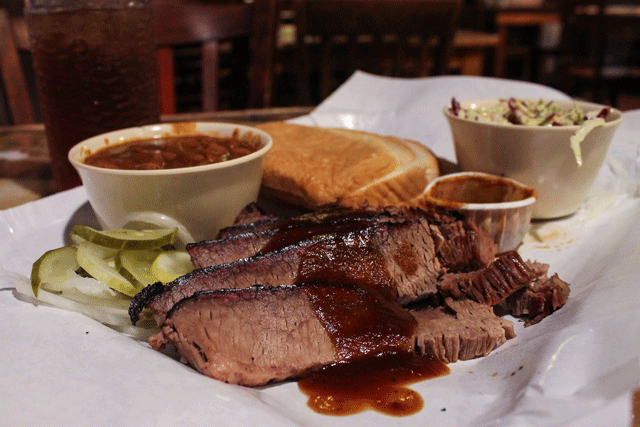Rising Beef Prices Biting Barbecue Joints and Brisket Fans

High demand for brisket, coupled with smaller cattle herds, is sending prices higher at Ruby’s BBQ, whose brisket platter is shown above, and other Austin restaurants. Photo by Lauren Lowe/Reporting Texas
By Cassandra Jaramillo
For Reporting Texas and the Austin Business Journal
Owners of the popular La Barbecue food truck on East Cesar Chavez Street were reluctant to raise their brisket prices, but they now charge $20 a pound, up from $15.98 three years ago.
General manager Ali Clem said rising beef prices left La Barbecue little choice.
“We have really held off raising prices,” said Clem. “Just to keep up and to keep our profits going, we had to raise prices.”
Barbecue joints across the nation have done the same, as soaring demand for Texas-style brisket collided with the shrinking size of cattle herds because of persistent drought in much of the nation, including Texas. According to the U.S. Department of Agriculture’s Economic Research Service, beef prices were 18.7 percent higher in December than they were a year earlier. The service said in January that beef prices are expected to rise another 5 percent or so this year.
Gary Johnson, owner of Bert’s Bar-B-Q on West 24th Street, a longtime favorite of University of Texas students and faculty, also raised prices recently.
“Prices have skyrocketed in the last two weeks. We just paid the highest prices we’ve ever paid for brisket at $4 a pound,” Johnson said. “For years, our brisket was [sold for] between $12 to $13 a pound. Now we are at $17.”
Family-owned Ruby’s BBQ on West 29th Street decided to raise brisket prices when the cost of beef took off in January 2014. Owner Patricia Mares said beef prices have more than doubled since then. Ruby’s sells natural beef brisket for $23.95 a pound.
“It has gone up drastically, more than in the previous 20 years,” she said. “Our food costs are horrendous, and it’s really hurting the bottom line.”
Mares said she already has ordered her beef supply for South by Southwest in March as she tries to manage meat costs.
Relief lies ahead, but it’s not coming soon. According to the USDA’s twice-yearly cattle count, beef herds were 2 percent larger in January than a year earlier. In an analysis of the USDA count, Purdue University economist Chris Hurt said in a news release that the supply of beef will continue to grow as the drought eases in some areas and cheap feed remains plentiful. The January expansion, he said, was the first since 2007.
It typically takes four to six years to rebuild herds.
Follow the reporter on Twitter: @cassandrajar